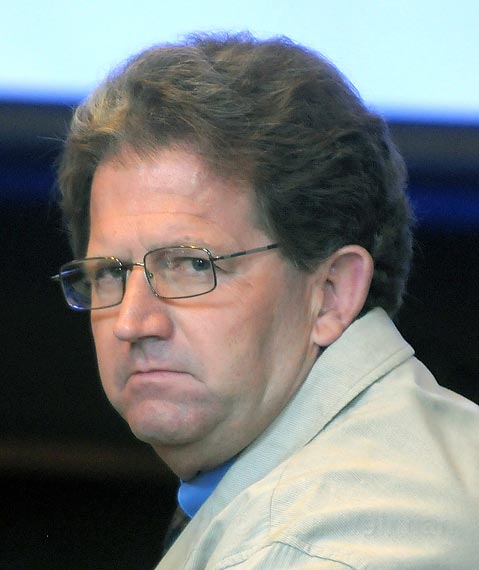Pretrial Hearing for Double Murder Suspect
Lawyers Spar Over Corey Lyons's Interrogation Room Conversation and Phone Call to Attorney
Tuesday marked day three in the pretrial hearings of a local man accused of a double murder that took place on the Mesa last year. The defendant, Corey Lyons, is accused of murdering his brother, Daniel Lyons, and sister-in-law, Barbara Scharton, over a dispute arising from a civil lawsuit that the two had filed against him in order to recoup losses the couple claimed they had suffered as a result of contracting with Lyons to build their dream home.

Judge Brian Hill has been listening to arguments from both the prosecutor and defense over the past few days on the admissibility of several pieces of evidence put forth as vital to the respective cases. Key among them was the prosecution’s so-called “whisper conversation,” a tape recording of the defendant and his wife talking to each other in hushed tones while alone in a room used by police to interview suspects.
Apparently unaware she was being recorded, Mildred Lyons could be heard asking her husband a number of questions, including whether or not he had committed the murders, to which he reportedly responded with an incomprehensible mumble. Defense Attorney Robert Sanger, who is representing Lyons in this case, has sought to have the tapes thrown out, arguing that the couple had a constitutionally protected right to privacy and that the content is unfairly prejudicial given the ambiguous nature of the recording. So far, Judge Hill has disagreed, but has stopped short of issuing a final ruling on the matter until he has a chance to see video that apparently accompanies the audio recording.
The prosecution also introduced a number of potential witnesses whose testimony would presumably be used to establish that after the civil suit was filed, the victims lived in constant fear of reprisal from the defendant. One of the witnesses, a next-door neighbor, was reportedly asked by Scharton to call the police if her brother-in-law was ever seen at the house. The defense responded by asserting that “these were people who had all kinds of enemies,” citing their decision to install high security doors, and their desire to obtain the permits that allow one to carry a concealed weapon long before any issue with the defendant became relevant.
The defense also insisted that if the victims had truly believed they had reason to fear the defendant, they would have at the very least changed the locks to their home. When pressed for a reason as to why Lyons might have had a key, or if the victims would have necessarily known that such a key existed, Sanger seemed to imply that because Lyons had been the contractor in charge of the construction of the home, any reasonable person would expect him to possess a key.
The last major issue addressed at the hearing also proved to be the most contentious. The issue centered on a phone call Lyons allegedly made to a local criminal defense attorney just hours after the double homicide was said to have taken place. While acknowledging that the content of any such conversation would surely be protected by attorney-client privilege, the prosecution argued that existence of the phone call, in and of itself, implied a consciousness of guilt, and as such, should be allowed as evidence for the jury to consider. The defense asserted that if the judge were to allow this, he would effectively be associating the act of seeking out legal counsel with an admission of guilt; thereby undermining his client’s constitutionally guaranteed right to a fair trial.
In the lengthy back and forth that followed, Judge Hill drew out, among other things, what he presumably considered to be the key distinction in this case: the timing of the call, which took place just hours after the crime and potentially before an otherwise innocent man would have had good cause to seek out an attorney. In the end, Judge Hill agreed to withhold his ruling in order to give the defense additional time to search for existing precedent on the matter for him to consider.
Judge Hill then briefly addressed the upcoming jury selection process, in which he stated his intention to dismiss any juror with prior knowledge of the case greater than that of a brief statement of the facts. The prosecution took issue with this, and argued that in order to have a fair trial, it would be necessary to approximate a true cross section of the county, which would undoubtedly include those members of the public familiar with local news. The prosecution went on to contend that just because a potential juror knows something about the case does not mean they are necessarily incapable of being impartial. Judge Hill remained adamant however, stating that “it’s a fairness issue,” while reiterating his preference that potential jurors should be limited to those with little to no knowledge of the case.
The pretrial hearing will continue on Wednesday at 2 p.m., with jury selection scheduled to start on Thursday at 10 a.m.



